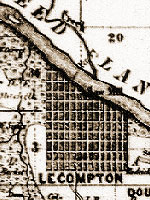With or Without Slavery?
Question

If the Lecompton Constitution version that would have allowed no further importation of slaves had won, would children born to the slaves already in Kansas still be considered slaves as well as their children into the future?
Answer
In the fall of 1857, the Kansas Territory's proslavery legislature met in the town of Lecompton and worked out a constitution, which it proposed to put up for a vote. The vote, however, was only between "the constitution with slavery" or "the constitution without slavery."
The proposed constitution was written in such a way that a vote "for the constitution without slavery" still allowed the residents of Kansas to keep the slaves they owned, while preventing new slaves from entering the territory.
Anti-slavery voters boycotted the referendum and consequently the "constitution with slavery" passed by a large margin. Kansas voters, however, eventually elected a new legislature and defeated the Lecompton Constitution. In 1859, they ratified the Wyandotte Constitution that outlawed slavery.
Article 7, Section 1, of the Lecompton Constitution stated that "… the right of the owner of a slave to such slave and its increase is the same and as inviolable as the right of the owner of any property whatever." The slave's "increase" meant the children of the slave, so they would still have been considered slaves, as would those slaves' children into the future.
For more information
Manuscript of the Lecompton Constitution
Thomas Goodrich. War to the Knife: Bleeding Kansas, 1854-1861. Mechanicsburg, PA: Stackpole Books, 1998.
Bibliography
Images:
"Forcing Slavery Down the Throat of a Free Soiler," 1856 political cartoon, Prints and Photographs Division, Library of Congress.
Detail of a map of Douglas County, Kansas Territory, 1858, showing the town of Lecompton.
Detail of an engraving of the town of Lecompton, 1859, Kansas State Historical Society.
